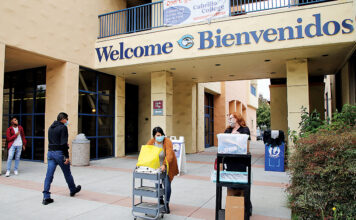SACRAMENTO—Governor Gavin Newsom issued a proclamation Thursday declaring Feb. 19, 2020, as A Day of Remembrance: Japanese American Evacuation in the State of California.
Starting in 1942 roughly 120,000 Japanese Americans were rounded up and held at 10 “internment camps” during World War II over two and a half years, as ordered by President Franklin D. Roosevelt’s executive order No. 9066.
The governor’s proclamation called the incarceration of thousands of United States citizens a “stain” on the country’s history that should serve as a lesson for future generations.
“Despite these experiences, thousands of young Japanese-American men enlisted in the U.S. armed forces, bravely fighting to defend the nation that was abridging their own freedoms at home,” the proclamation reads. “We honor their sacrifice, as well as the resilience that made it possible for thousands of Japanese-American families to reclaim and rebuild their lives after the war. A decision motivated by discrimination and xenophobia, the internment of Japanese Americans was a betrayal of our most sacred values as a nation that we must never repeat.”
President Gerald Ford in 1974 officially terminated the executive order and apologized for the incarcerations, and President Jimmy Carter in 1980 created the Commission on Wartime Relocation and Internment of Civilians, which was tasked with studying the impact the executive order had on Japanese-Americans.
That commission in 1983 concluded that the detentions were a result of racial prejudice, war hysteria and failure of political leadership. Five years later, the U.S. government formally apologized and paid $20,000 in reparations to each victim.
For many of those detained, even the money they received did not come close to helping them recover what they lost.










